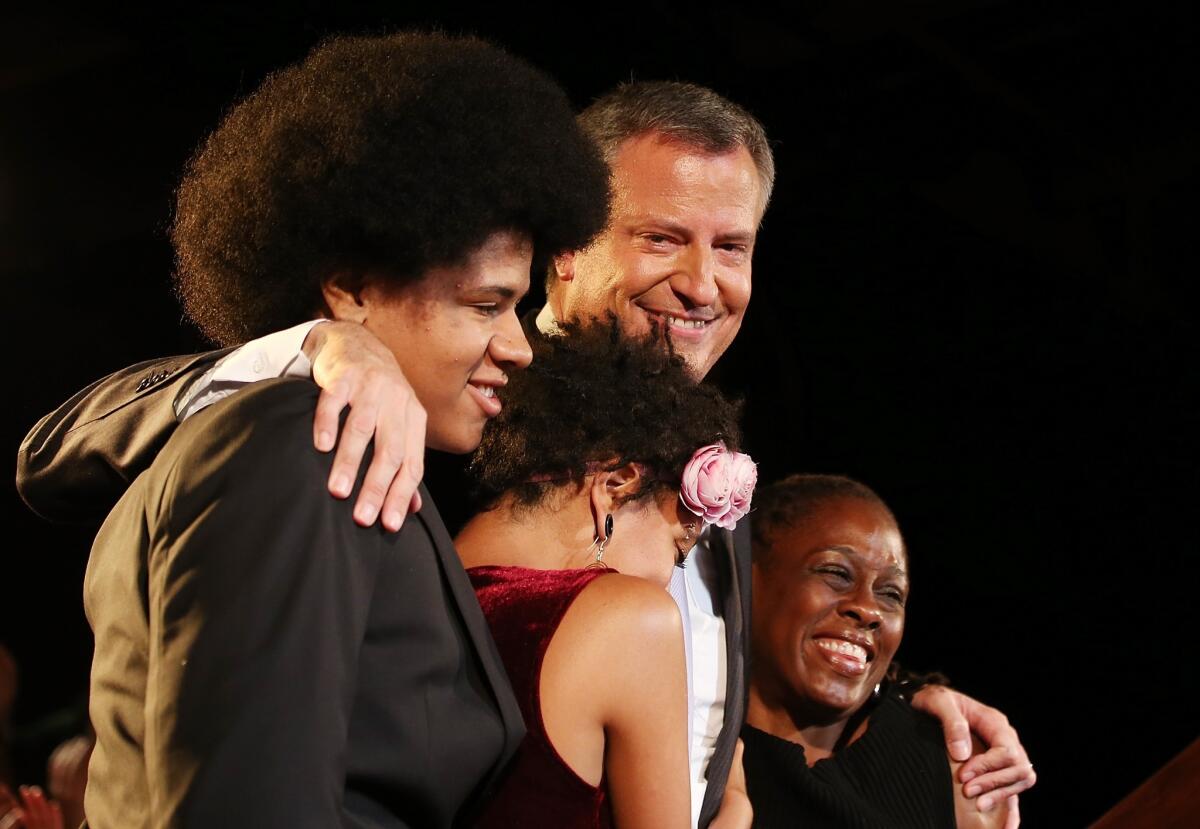Is it De Blasio? New York mayoral primary still too close to call

- Share via
NEW YORK -- New Yorkers awoke Wednesday still uncertain over who would be their Democratic nominee for mayor as primary results showed front-runner Bill de Blasio clinging to the lead needed to avoid a runoff, even as his rival vowed to keep fighting.
William Thompson, who was in second place and who ran unsuccessfully for mayor in 2009 against Michael Bloomberg, was upbeat late Tuesday as returns indicated that he would face De Blasio in a runoff next month.
“We took Mike Bloomberg on, and we almost beat him,” a broadly grinning Thompson told supporters near midnight Tuesday, referring to his failed mayoral bid four years earlier. “Now, we’re going to finish what we started.”
But minutes later, results showed De Blasio topping the 40% needed to clinch the nomination, and the numbers remained too close to call Wednesday. The close finish was certain to lead to calls for recounts, especially given problems with some of the city’s antiquated voting machines.
Some voters, including Republican mayoral candidate Joseph Lhota, had to cast written ballots when machines failed. Other voters cast affidavit ballots after they showed up at polling stations where their names were not registered. Also, thousands of absentee ballots have yet to be counted, a process expected to drag into next week.
Whatever the final outcome, the Democratic race marked a startling turnaround for De Blasio, the liberal public advocate who just a few weeks earlier lagged behind City Council Speaker Christine Quinn and Anthony Weiner, the former congressman forced to resign from office in 2011 amid a sexting scandal.
Quinn came in third. During the campaign, De Blasio and Thompson focused on her close ties to the Bloomberg administration and portrayed themselves as candidates better able to serve middle-class, non-white New Yorkers.
De Blasio, surrounded by his wife and two children, told supporters shortly after midnight Tuesday that he would end the era of exclusivity that he said had marked the billionaire Bloomberg’s 12 years in office.
“We are a city that leads the nation, that leads the world in remembering that we are bigger, we are stronger, we are better as a city when we make sure that everyone has a shot,” said De Blasio, who added that the wealthy and the white had gotten ahead at others’ expense for too long. “We begin tonight.”
Weiner, whose campaign started out strong but fizzled quickly after another of his sexting partners came forward, ended up with less than 5% of the vote. The once-promising congressional representative made an obscene gesture at journalists late Tuesday as he left his post-election party.
The candidates were silent Wednesday as New York paused to remember the Sept. 11, 2001 attacks that brought down the World Trade Center, killed more than 3,000 people and changed many people’s views on how best to secure the nation’s largest city.
Republican voters’ selection of Lhota to be their mayoral candidate reflected their support for the conservative policies of former Mayor Rudy Giuliani, who was in office at the time of the attacks, and for Police Commissioner Raymond Kelly. Lhota was Giuliani’s deputy mayor, and he and Giuliani support Kelly’s policing tactics, which they say have brought down crime and protected the city from further attacks.
De Blasio, and to a lesser extent Thompson and most of the other Democratic candidates, criticized Kelly for a program that included spying on Muslims, and for a stop-and-frisk policy that affected mainly black and Latino youth.
De Blasio has vowed to replace Kelly if he becomes mayor, saying the stop-and-frisk policy amounts to racial profiling. His message resonated with black and Latino voters, as did his personal background: De Blasio, who is white, is married to a black woman and has two children whose skin color, critics of the policy say, makes them more likely than whites to be subjected to random police stops.
ALSO:
Income gap between rich and poor biggest in a century
New George Zimmerman video shows his encournter with police
Voters outs Colorado lawmakers who supported stricter gun control laws
Twitter: @tinasusman[email protected]
More to Read
Sign up for Essential California
The most important California stories and recommendations in your inbox every morning.
You may occasionally receive promotional content from the Los Angeles Times.











